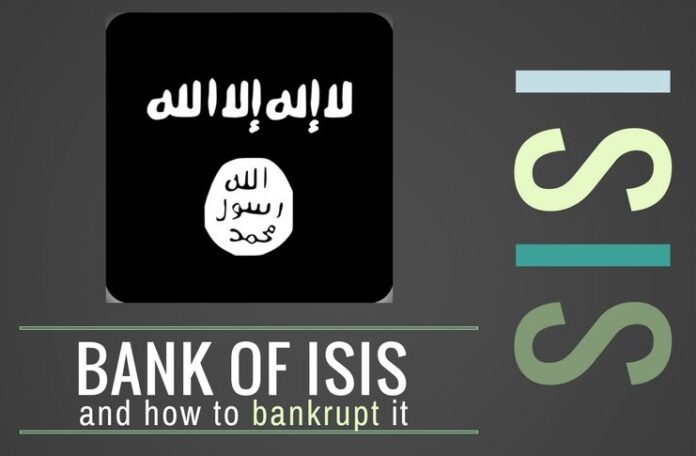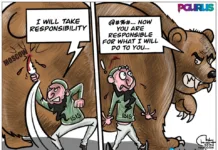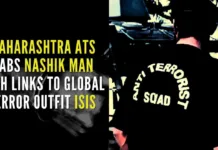
[dropcap color=”#008040″ boxed=”yes” boxed_radius=”8px” class=”” id=””]W[/dropcap]hen you think of ISIS, forget the image of balaclava-clad men, with kalashnikovs screaming “Allahu Akbar”. Think of a carefully managed startup that has, like other successful companies, lured international investors, diversified its income and widened its outreach. Just like any startup runs on equity and investment, this terrorist organisation also obtained funds to organise its structure and plan operations.
If ISIS Inc. was headquartered in Silicon Valley, it would be considered one of the top private companies in America. Based on even conservative estimates, last year the group controlled assets in excess of $2 trillion, with an annual income amounting to $2.9 billion, according to Thomson Reuters. That’s more revenue than the retailer J Crew and the household appliance corporation, Conair, earn a year.
Yet, in defeating ISIS, it’s important to dispel short-term solutions, particularly those that fall under the sway of “retribution” such as mass bombing. Sanctions and intense warfare alone won’t work, because ISIS thrives on the failure of Middle Eastern governments. To beat ISIS, governments must first address President Bashar al-Assad’s government in Syria as part of the problem. This is a mess born of the Iraq war and the Syrian civil war, the brutality and sectarianism of which has become a recruiting tool for the Islamic State.“Assad is not a sideshow,” says Emile Hokayem in this report. “He is at the center of this massive dilemma.”
[dropcap color=”#008040″ boxed=”yes” boxed_radius=”8px” class=”” id=””]T[/dropcap]ake ISIS’s authority over oil, for starters. It is by far the most lucrative commodity for the group. It is the “black gold that funds Isis’ black flag” and not only fuels the war machine, but also provides electricity and gives the jihadis critical leverage against their neighbours. Yet, blindly bombing ISIS’s oil reserves could actually help it more than it could hurt it by disrupting the livelihood of those who relied on oil trade. As Hassan Hassan, Chatham House associate fellow, writes:
Airstrikes disrupted this wartime economy and many families, who continued to buy oil from its new owners, ISIS, increasingly found it difficult to find alternative means to survive. This pushed some families to send their sons to join ISIS as the only way to generate a monthly income, according to several individuals living under ISIS.
The depletion of Syria’s ageing oilfields are, alone, containing ISIS to some degree. The group’s need for fuel for military operations also means there’s less to sell in the market.
It’s too late to expect that freezing the assets and halting the sale of weapons to those countries that have supported ISIS will stunt the organisation’s power.The jihadist group has already become immune to international sanctions.
Not only has it infiltrated every aspect of the economy, including the banking system (for example, more than 20 Syrian financial institutions continue to operate in ISIS-held territory, according to Matthew Levitt, director of the Stein Counterterrorism program), it has also been making millions for years simply through a string of illegal activities (think: extortion through illegal taxes, and kidnap and ransom payments, selling sex slaves and plundering of antiquities excavated from ancient palaces and archaeological sites).
[dropcap color=”#008040″ boxed=”yes” boxed_radius=”8px” class=”” id=””]S[/dropcap]o any optimism that ISIS will have financial oversight is short-lived. In fact, “blocking the assets that fill ISIS’ coffers would mean rethinking the world’s economy,” says Italian journalist Roberto Saviano, an impossible feat considering the group has already exploited the underbelly of the financial system.
So how do we bankrupt ISIS, considering all the above?
Forget the strategy that addresses the symptoms not the disease. Indeed, as Emad Mostaque, strategist at Ecstrat tells Rebel Economy:
Our governments guarantee us safety from political violence, so when political violence is introduced into public life, governments typically over react and expend valuable resources fighting a small, hard-to-hit enemy.
This is why the war on terror has been a resounding failure, spending $2 trillion, killing 2 million civilians and seeing the number of enemy recruits going from under 1,000 to over 100,000 in 14 years.
Instead, there should be more focus on a long-term option that addresses grave unemployment (remember, ISIS thrives on the Arab world’s failures to provide to the people and relies on unemployed youths for new recruits). This means providing people with opportunities to enter competitive, labour intensive jobs, within blue-collar industries and prevent the draw to radicalism. It is a strategy for economic reform that critically channels most of the gains to the bottom 80%. The summary of this five-fold plan, by Middle East analyst Nathan Field, is necessary reading for understanding why ISIS continues to recruit and grow stronger.
In the end, there’s many things to be done:
-
Focus on resolving the Syria crisis as a whole and life after the Assad regime
-
Get the region to think differently about jobs for youths to help stem the flow of disenfranchised young people to ISIS
-
Targeted attacks against ISIS to limit their growth, and other sanctions
-
Cyber war on the ISIS propaganda machine to mitigate their message
There’s also a radical option, more in line with the rebel fighters of Libya. Train Syrian refugees in Turkey and other parts of Europe in the art of sabotage and send them back in as the Resistance. The most embarrassing problem for ISIS is their own “people” striking back at them. Bankrupting ISIS, a terror group which has further reach than any group before it, can only happen if the entire structure collapses, and that starts from within.
Reproduced with permission from RebelEconomy.com. Formatted for better viewing.
Note:
1. Text in Blue points to additional data on the topic.
- Bank of ISIS and how to bankrupt it - September 4, 2016











As long as the menace is contained within the Islamic world no one need be overly bothered. The world’s TWO ONLY TRUE religions are pre destined to annihilate each other in their war for supremacy.
Only countries with vulnerable ,radicalized, mixed population need to fight in real earnest for their own survival.
Indian Muslims must be treated with equal opportunity as proposed in my website ‘equalindian.com’ along with other people and not appeasement with reservations, Haz subsidy, minority status etc to keep them with India.
In addition the entire community must not be targeted for freak incidences which should be tackled with Govt law and order machinery expeditiously.
Very Simple. Ban the Fed